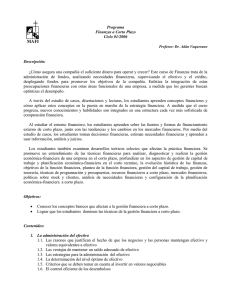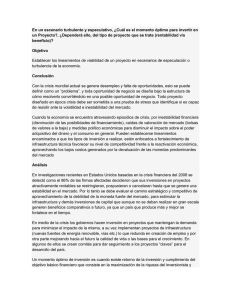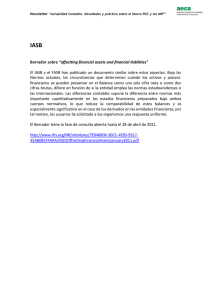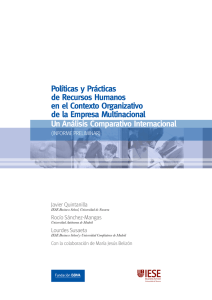programa docente o syllabus
Anuncio
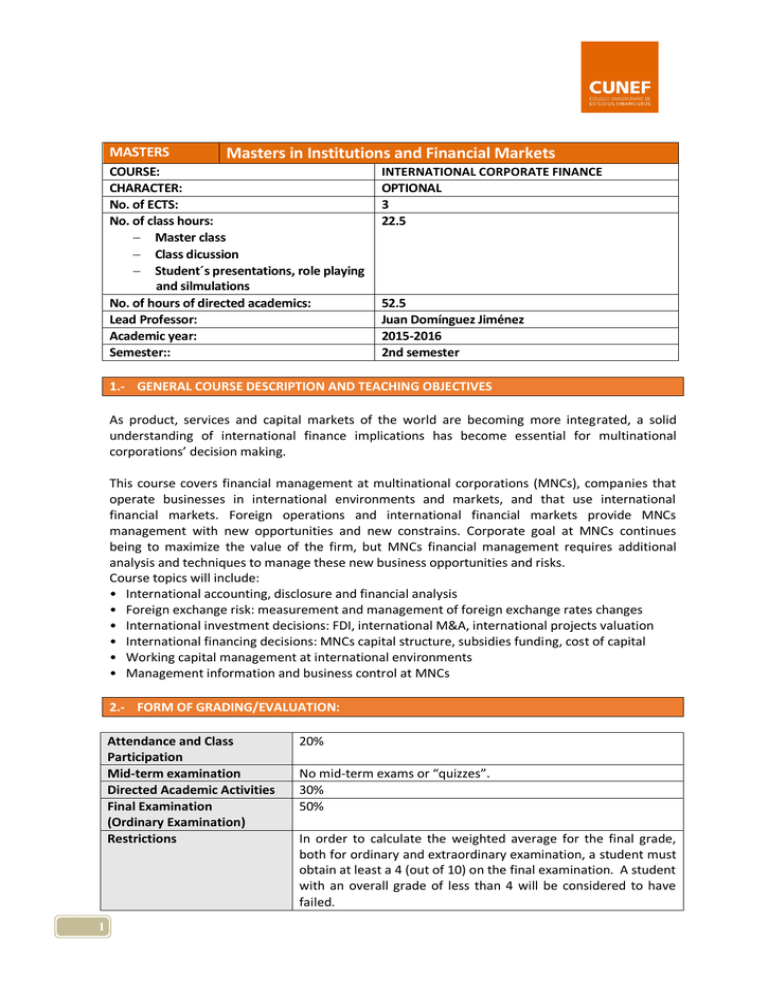
MASTERS Masters in Institutions and Financial Markets COURSE: CHARACTER: No. of ECTS: No. of class hours: Master class Class dicussion Student´s presentations, role playing and silmulations No. of hours of directed academics: Lead Professor: Academic year: Semester:: INTERNATIONAL CORPORATE FINANCE OPTIONAL 3 22.5 52.5 Juan Domínguez Jiménez 2015-2016 2nd semester 1.- GENERAL COURSE DESCRIPTION AND TEACHING OBJECTIVES As product, services and capital markets of the world are becoming more integrated, a solid understanding of international finance implications has become essential for multinational corporations’ decision making. This course covers financial management at multinational corporations (MNCs), companies that operate businesses in international environments and markets, and that use international financial markets. Foreign operations and international financial markets provide MNCs management with new opportunities and new constrains. Corporate goal at MNCs continues being to maximize the value of the firm, but MNCs financial management requires additional analysis and techniques to manage these new business opportunities and risks. Course topics will include: • International accounting, disclosure and financial analysis • Foreign exchange risk: measurement and management of foreign exchange rates changes • International investment decisions: FDI, international M&A, international projects valuation • International financing decisions: MNCs capital structure, subsidies funding, cost of capital • Working capital management at international environments • Management information and business control at MNCs 2.- FORM OF GRADING/EVALUATION: Attendance and Class Participation Mid-term examination Directed Academic Activities Final Examination (Ordinary Examination) Restrictions 1 20% No mid-term exams or “quizzes”. 30% 50% In order to calculate the weighted average for the final grade, both for ordinary and extraordinary examination, a student must obtain at least a 4 (out of 10) on the final examination. A student with an overall grade of less than 4 will be considered to have failed. Final Examination (ExtraordinaryExamination) Session No. 1 4-7 8-9 10 11-12 2 Grading of the directed academic activities from the ordinary examination will be applied to the extraordinary examination using the same weighting. A student will have to present new work if he/she fails the ordinary examination, or if he/she passes this examination but wishes to improve his/her grade. DETAILED PROGRAM INTERNATIONAL CORPORATE FINANCE Details of teaching content: themes, case studies, Required reading that relate directed acadamicactivites, etc. to concepts developed in the session. Introduction to International Financial Multinational Management Business Finance - International business and international (Eiteman, Stonehill financial markets development and Moffett) - Financial management at MNCs Chapters 1 and 2 - International accounting: consolidated International financial statements preparation, disclosure, Accounting and financial analysis (Doupnik and Perera) Chapters 1, 2, 3, 4, 5, and 6 FX management Multinational - FX markets Business Finance - Exchange rate forecasting (Eiteman, Stonehill - Measuring and managing FX exposures: and Moffett) transactional exposure, economic exposure Chapters 6, 7, 8, 9, and translation exposure 10, 11 and 12 - FX hedging strategies Investing and Financing decisions at MNCs Multinational - Foreign investment Business Finance - Country risk (Eiteman, Stonehill - International capital decisions and Moffett) - Cross border M&A Chapters 13, 14, 16, - Capital structure at MNCs 17 and 18 - Subsidiaries funding - Cost of capital at MNCs Working capital management at MNCs Multinational - Short-term asset and liability management Business Finance - International cash management (including (Eiteman, Stonehill international netting and cash pooling) and Moffett) Chapter 19 Management information and business Cost Accounting. A Managerial control at MNCs Emphasis - Managerial accounting (Horngren, Datar - Planning - Reporting - International transfer pricing and tax implications and Rajan) Chapters 22 and 23 Multinational Business Finance (Eiteman, Stonehill and Moffett) Chapter 15 13-14 15 Final dissertations presentations - Presentation by the students at class of final dissertations Additional cases and problems Final session - Module recapitulation - Additional cases and problems - Exam preparation ADITIONAL INFORMATION Basic/RequiredReading Recommended Reading Multinational Business Finance Publisher: Pearson Education Limited Authors: David K. Eiteman, Arthur I. Stonehill and Michael H. Moffett International Financial Management Publisher: South-Western, Cengage Learning Author: Jeff Madura International Financial Management Publisher: McGraw-Hill Education Authors: Cheol S. Eun and Bruce G. Resnick International Accounting Publisher: McGraw-Hill Education Authors: Timothy S. Doupnik and Hector B. Perera Cost Accounting. A Managerial Emphasis Publisher: Prentice Hall (Pearson) Authors: Charles T. Horngren, Srikant M. Datar and Madhav V. Rajan 3 Complementary Activities Professor´s email COMPETENCIAS: BÁSICAS Y GENERALES TRANSVERSALES ESPECÍFICAS 4 Cases and practical problems will be solved by participants during sessions and as homework between sessions. Final dissertations will be: - prepared individually or in pairs during the course - mentored by the professor - presented at class during sessions 13 and 14 - delivered after class presentation through the Postgraduate Platform Further details will be provided by the professor during the first session (Note: work originality to be verified using Turnitin) Email: [email protected] (office hours: after class or by appointment) CB6- Poseer y comprender conocimientos que aporten una base u oportunidad de ser originales en el desarrollo y/o aplicación de ideas, a menudo en un contexto de investigación. CB7- Que los estudiantes sepan aplicar los conocimientos adquiridos y su capacidad de resolución de problemas en entornos nuevos o poco conocidos dentro de contextos más amplios (o multidisciplinares) relacionados con su área de estudio. CB8- Que los estudiantes sean capaces de integrar conocimientos y enfrentarse a la complejidad de formular juicios a partir de una información que, siendo incompleta o limitada, incluya reflexiones sobre las responsabilidades sociales y éticas vinculadas a la aplicación de sus conocimientos y juicios. CB9- Que los estudiantes sepan comunicar sus conclusiones y los conocimientos y razones últimas que las sustentan a públicos especializados de un modo claro y sin ambigüedades. CG1- Capacidad para resolver problemas en entornos nuevos o poco conocidos CG2- Capacidad de análisis, síntesis y de formulación de juicios a partir de la información disponible. GG3- Capacidad de organización, planificación y toma de decisiones. CG4- Capacidad de comunicación y trabajo en equipo. CT1- Capacidad de búsqueda de información e investigación y de aprendizaje continuo CT2- Capacidad para trabajar en entornos de presión. CT3- Capacidad para aplicar los conocimientos a la práctica. CT4- Usar tecnologías de la información y las telecomunicaciones. CT5- Capacidad para ejercer el liderazgo y mantener un espíritu emprendedor. CE9 Comprender y entender el funcionamiento de las operaciones de financiación de proyectos y actividades desde la perspectiva de las actividades empresariales internacionales. (Competencia específica de la especialidad de finanzas Internacionales).
